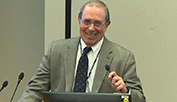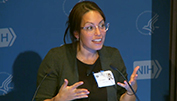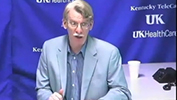-
- NIH VideoCast - Visual Restoration: Bridges and Gaps to Curing Blindness in Humans
-
- - Andrew Huberman, Ph.D., Stanford University (2017/01/26)
- - Category : Special
- National Eye Institute Audacious Goals Initiative (AGI) Seminar Series in Neuroregeneration
Huberman is an associate professor at the Stanford University School of Medicine, departments of neurobiology and ophthalmology, and a faculty member of Bio-X, Stanford`s interdisciplinary biosciences program. His seminar will summarize strategies for neuroregeneration of the visual system, reveal what scientists have learned by studying organisms with robust regenerative capacity, and describe how medicine is applying this knowledge to someday reverse vision loss in humans.
The NEI AGI Seminar Series in Neuroregeneration explores topics relevant to regenerative neuroscience and medicine, with special emphasis on the visual system. For more information about the series, visit https://nei.nih.gov/audacious
NIH VideoCast - Visual Restoration: Bridges and Gaps to Curing Blindness in Humans
-
- NIH VideoCast - Demystifying Medicine 2017: New Approach to Atherosclerosis from Studies of Chronic Granulomatous Disease
-
- - John I. Gallin, MD, Clinical Center, NIH (2017/01/26)
- - Category : Demystifying Medicine
- The Demystifying Medicine Lecture Series is designed to help bridge the gap between advances in biology and their applications to major human diseases. Each lecture will feature a presentation on a major disease, including current research and advancements on treatments.
For more information go to https://demystifyingmedicine.od.nih.gov
NIH VideoCast - Demystifying Medicine 2017: New Approach to Atherosclerosis from Studies of Chronic Granulomatous Disease
-
- NIH VideoCast - CC Grand Rounds: What is the NIMH Research Domain Criteria (RDoC) Initiative and How Does It Apply to Mental Health Disorders?
-
- - 1) Sarah Morris, PhD, Associate Director, Research Domain Criteria (RDoC) Unit, NIMH, NIH and 2) Daniel S. Pine, MD, Chief and Senior Investigator, Section on Development and Affective Neuroscience, Intramural Research Program, NIMH, NIH (2017/01/26)
- - Category : Clinical Center Grand Rounds
- CC Grand Rounds: What is the NIMH Research Domain Criteria (RDoC) Initiative and How Does It Apply to Mental Health Disorders?
For more information go to http://www.cc.nih.gov/about/news/grcurrent.html
NIH VideoCast - CC Grand Rounds: What is the NIMH Research Domain Criteria (RDoC) Initiative and How Does It Apply to Mental Health Disorders?
-
- NIH VideoCast - NEI Council Meeting Public Review - January 2017
-
- - National Eye Institute, NIH (2017/01/24)
- - Category : Advisory Board Meetings and Workshops
- Paul A. Sieving, MD, PhD, the Director of the National Eye Institute (NEI), presides as Chair and Paul Sheehy, PhD, as Executive Secretary to the National Advisory Eye Council (NAEC). The meeting is open to the public from 08:30 a.m. until 12:35 p.m. then the meeting will be closed to the public for the review of confidentiality and conflict of interest procedures and a review of grant and cooperative agreement applications on visual disorders, preservation of sight, and the special health problems and requirements of individuals with visual impairments. It also conducts the second level peer review of grant applications.
NIH VideoCast - NEI Council Meeting Public Review - January 2017
-
- NIH VideoCast - The Large-Scale Organization of Shape Processing: A Broader Vision of Vision
-
- - Marlene Behrmann, Ph.D., George A. and Helen Dunham Cowan Prof. of Cognitive Neuroscience, Department of Psychology, Carnegie Mellon University (2017/01/24)
- - Category : Neuroscience
- NIH Neuroscience Series Seminar
Despite the fact that visual scenes may contain multiple objects and people, humans can recognize the objects and individuals with ease and accuracy. Research in Dr. Behrmann???s lab focuses on studying how this is achieved - what are the necessary psychological processes and representations that underlie abilities such as object segmentation and recognition, face recognition, mental imagery, reading and writing and spatial attention? Although these questions are asked within the framework of information-processing models used in cognitive psychology, they are also interested in identifying the neural mechanisms which are responsible for these complex abilities.
The major approach they use to address these questions is to study the behavior of human adults who have sustained brain damage (usually through stroke or head injury) which selectively affects their ability to carry out these processes. For example, some patients are impaired at recognizing faces (prosopagnosia or face blindness), some are impaired at recognizing objects (visual object agnosia) and some are unable to represent visuospatial information (hemispatial neglect). By examining patterns of associations and dissociations among abilities after brain damage, one can make inferences about the functional and structural organization of the brain. This neuropsychological approach is combined with several other methods: experiments from traditional cognitive psychology paradigms (analyzing the response latencies and accuracies of normal subjects); simulations of artificial neural networks which may be used to model these processes and their breakdown following brain-damage; and functional neuroimaging studies which examine the biological substrate of high-level vision.
A final thread to their research is to conduct rehabilitation studies with the brain damaged subjects in order to treat the observed deficit. Carefully planned rehabilitation studies provide valuable information which can shed light on the mechanisms underlying visual cognition.
For more information go to https://neuroscience.nih.gov
NIH VideoCast - The Large-Scale Organization of Shape Processing: A Broader Vision of Vision
-
- NIH VideoCast - National Advisory Council on Aging - January 2017
-
- - NIA, NIH (2017/01/21)
- - Category : Advisory Board Meetings and Workshops
- The National Advisory Council on Aging (NACA) advises the Secretary of the U.S. Department of Health and Human Services, the Director of NIH, and the Director of NIA on its mission. The Council meets three times a year to consider applications for research and training and to recommend funding for promising applications.
NIH VideoCast - National Advisory Council on Aging - January 2017
-
- NIH VideoCast - National Center for Advancing Translational Sciences Advisory Council/Cures Acceleration Network Review Board - January 2017
-
- - National Center for Advancing Translational Sciences, NIH (2017/01/20)
- - Category : NCATS Council
- The Jan. 12, 2017, joint meeting of the NCATS Advisory Council and the Cures Acceleration Network Review Board will feature presentations by NCATS leadership and invited guests. In addition, NCATS staff will present proposed initiative concepts for Advisory Council/CAN Review Board consideration. For more information, visit: https://ncats.nih.gov/advisory/council and https://ncats.nih.gov/advisory/canboard
For more information go to https://ncats.nih.gov/events
NIH VideoCast - National Center for Advancing Translational Sciences Advisory Council/Cures Acceleration Network Review Board - January 2017
-
- NIH VideoCast - NBBTP Completion Award Ceremony - January 2017
-
- - Dr. Marcus Hodges, Fellowship Director and Dr. Deborah Wilson, RADM, Director, DOHS (2017/01/20)
- - Category : Special
- Award ceremony to present certificates of completion to NBBTP`s graduating seniors. The ceremony is also to award Certificates of Appreciation to DOHS staff for their hard work and dedicated service to making the NBBTP successful.
NIH VideoCast - NBBTP Completion Award Ceremony - January 2017
-
- NIH VideoCast - CC Grand Rounds: 1) Human Translational Studies of Inflammation and Cardio-Metabolic Diseases and 2) Subclinical Inflammation in Large Vessel Vasculitis
-
- - 1) Nehal Mehta, MD, Lasker Clinical Research Scholar and Chief, Section of Inflammation and Cardiometabolic Diseases, NHLBI, NIH and 2) Peter Grayson, MD, MSc, Assistant Clinical Investigator, Systemic Autoimmunity Branch, NIAMS, NIH (2017/01/20)
- - Category : Clinical Center Grand Rounds
- CC Grand Rounds: 1) Human Translational Studies of Inflammation and Cardio-Metabolic Diseases and 2) Subclinical Inflammation in Large Vessel Vasculitis
For more information go to http://www.cc.nih.gov/about/news/grcurrent.html
NIH VideoCast - CC Grand Rounds: 1) Human Translational Studies of Inflammation and Cardio-Metabolic Diseases and 2) Subclinical Inflammation in Large Vessel Vasculitis
-
- NIH VideoCast - Building circuits to process visual information
-
- - Hollis Cline, Ph.D., Chairman of the Department of Molecular and Cellular Neuroscience, Hahn Professor of Neuroscience in the Departments of Molecular and Cellular Neuroscience and Chemical Physiology at The Scripps Research Institute (2017/01/20)
- - Category : WALS - Wednesday Afternoon Lectures
- NIH Director???s Wednesday Afternoon Lecture Series
Visual experience is essential to establish functional connectivity throughout the visual system, however the mechanisms by which activity influences neuronal development and circuit connectivity are not clear. Using Xenopus tadpoles we have identified the cellular and molecular effects of visual experience on topographic map formation, on tectal cell development and on development of the visual circuit. Dr. Cline will present results of in vivo imaging experiments demonstrating novel cellular mechanisms by which experience controls visual circuit plasticity and function.
For more information go to https://oir.nih.gov/wals
NIH VideoCast - Building circuits to process visual information
-
- NIH VideoCast - The multi-faceted role of the IgG glycan
-
- - Galit Alter, PhD, Associate Professor in Medicine, Harvard Medical School (2017/01/20)
- - Category : Immunology
- Immunology Interest Group Seminar Series
Beyond their role in pathogen neutralization, antibodies mediate pathogen control and clearance via the recruitment of innate immune effector functions including phagocytosis and cytotoxicity but also via the homeostatic regulation of the immune activation. Two modifications to the constant domain of the IgG antibody control this biological activity: 1) the irreversible genomic selection of isotype/subclass and 2) a more subtle alteration in Fc-glycosylation, that together provide instructions to the innate immune system . Because glycosylation alters the affinity of antibodies for Fc-receptors on innate immune cells, mounting evidence suggests that glycosylation may be actively exploited by the immune system to tune antibody biological activity far beyond pathogen control and clearance. While many monoclonal therapeutics have exploited glycosylation, its in vivo control and whether it may be selectively harnessed to target pathogens and/or tumors is unknown. Two distinct functional roles of antibodies will be discussed in this presentation including the role of antibodies the regulation of the induction of the fhumoral immune response as well as in the regulation of antibody transfer from mother to child.
Galit Alter received her PhD in experimental medicine from McGill University, and is currently an Associate Professor in Medicine at Harvard Medical School. Over the past 8 years her research has focused on understanding the role of the innate immune response to chronic viral infections, including HIV and HCV, with a focus on defining the role of Natural Killer (NK) cells in antiviral control. Recently, these studies have shifted gears to begin to define the mechanism by which these innate immune effector cells may be harnessed through vaccination to gain more effective control over viral replication. To do this, her current research interests lie in defining the role of innate immune recruiting antibodies in providing protection from infection. Specifically, she is working towards defining the pathways that result in the targeted production of ???protective??? antibody glycans to enhance the production of antibodies that can potently block infections. Advancement in understanding how to manipulate the antibody glycan in a targeted manner through vaccination will also lead to the generation of vaccines with broader applications by extending to the improvement of therapeutic vaccines for the treatment of malignancies and autoimmune diseases as well. This knowledge will provide insights into natural antibody glycovariation, and lead to the development of novel approaches to strategically tailor vaccines to induce innate immune cell-recruiting antibodies, with the hope that these findings will ultimately revolutionize the application of vaccines to treat and prevent a remarkably larger range of diseases.
NIH VideoCast - The multi-faceted role of the IgG glycan
-
- NIH VideoCast - Involvement of the Werner Syndrome Protein (WRN) in Telomeric Recombination
-
- - Dr. David Orren, University of Kentucky (2017/01/19)
- - Category : DNA Repair
- DNA repair videoconference
Acrobat Slides
NIH VideoCast - Involvement of the Werner Syndrome Protein (WRN) in Telomeric Recombination
-
- NIH VideoCast - Demystifying Medicine 2017: Addiction and Habituation: Drugs and Food
-
- - Nora Volkow, MD, PhD, NIDA, NIH and Kevin Hall, PhD, NIDDK, NIH (2017/01/19)
- - Category : Demystifying Medicine
- The Demystifying Medicine Lecture Series is designed to help bridge the gap between advances in biology and their applications to major human diseases. Each lecture will feature a presentation on a major disease, including current research and advancements on treatments.
For more information go to https://demystifyingmedicine.od.nih.gov/
NIH VideoCast - Demystifying Medicine 2017: Addiction and Habituation: Drugs and Food
-
- NIH VideoCast - Clinical Center Research Hospital Board Meeting - January 2017
-
- - Office of the Director, NIH (2017/01/18)
- - Category : Advisory Board Meetings and Workshops
- Clinical Center Advisory Board Meeting
For more information go to https://ccrhb.od.nih.gov/charter.htm
NIH VideoCast - Clinical Center Research Hospital Board Meeting - January 2017
-
- NIH VideoCast - Interagency Autism Coordinating Committee - January 2017
-
- - NIH (2017/01/18)
- - Category : Interagency Autism Coordinating Committee
- This is the 1st quarter meeting of the Interagency Autism Coordinating Committee
For more information go to https://iacc.hhs.gov
NIH VideoCast - Interagency Autism Coordinating Committee - January 2017
-
- NIH VideoCast - Big Data Processing & Medicine ??? a use case presentation
-
- - Shawn Dolley, Cloudera (2017/01/18)
- - Category : Special
- Big Data processing with Hadoop is revolutionizing medicine. Enabling Genomic Analysis on much larger scale, providing the backbone for precision medicine by unifying research & clinical silos, and enabling bedside data to keep for retrospective analysis. This talk will cover real uses cases in Genomics and Medicine for big data and Hadoop. It will also touch on the technology used to accomplish the results.
NIH VideoCast - Big Data Processing & Medicine ??? a use case presentation
-
- NIH VideoCast - All of Us Research Program Advisory Panel - January 2017
-
- - NIH (2017/01/14)
- - Category : Advisory Board Meetings and Workshops
- The All of Us Research Program Advisory Panel is a working group of the NIH Council of Councils and was convened to provide external oversight and expert advice on the vision, scientific goals, and operations of the Program. The Panel is charged with evaluating and providing recommendations regarding All of Us Research Program activities.
For more information go to https://www.nih.gov/research-training/allofus-research-program
NIH VideoCast - All of Us Research Program Advisory Panel - January 2017
-
- NIH VideoCast - CC Grand Rounds: Contemporary Clinical Medicine: Great Teachers: ???Genderation??? of Youth: ??Developmental Considerations in the Clinical Approach to Gender Diverse and Transgender Children and Adolescents
-
- - Scott Leibowitz, MD, Child and Adolescent Psychiatrist and Medical Director of Behavioral Health, THRIVE Program (Differences of Sexual Development and Gender Concerns), Nationwide Children???s Hospital, Columbus, Ohio (2017/01/14)
- - Category : Clinical Center Grand Rounds
- CC Grand Rounds: Contemporary Clinical Medicine: Great Teachers: ???Genderation??? of Youth: Developmental Considerations in the Clinical Approach to Gender Diverse and Transgender Children and Adolescents
For more information go to http://www.cc.nih.gov/about/news/grcurrent.html
NIH VideoCast - CC Grand Rounds: Contemporary Clinical Medicine: Great Teachers: ???Genderation??? of Youth: ??Developmental Considerations in the Clinical Approach to Gender Diverse and Transgender Children and Adolescents
-
- NIH VideoCast - Leptin and the neural circuit regulation food intake and glucose metabolism
-
- - Jeffrey Friedman, M.D., Ph.D., Professor, The Rockefeller University; Director, Starr Center for Human Genetics; Investigator, Howard Hughes Medical Institute (2017/01/13)
- - Category : WALS - Wednesday Afternoon Lectures
- NIH Director???s Wednesday Afternoon Lecture Series
The discovery of leptin has led to the elucidation of a robust physiologic system that maintains fat stores at a relatively constant level. Leptin is a peptide hormone secreted by adipose tissue in proportion to its mass. This hormone circulates in blood and acts on the hypothalamus to regulate food intake and energy expenditure. When fat mass falls, plasma leptin levels fall stimulating appetite and suppressing energy expenditure until fat mass is restored. When fat mass increases, leptin levels increase, suppressing appetite until weight is lost. By such a mechanism, total energy stores are stably maintained within a relatively narrow range.
Recessive mutations in the leptin gene are associated with massive obesity in mice and some humans. Treatment with recombinant leptin markedly reduces food intake and body weight. The low leptin levels in patients with leptin mutations are also associated with multiple abnormalities including infertility, diabetes, and immune abnormalities all of which are corrected by leptin treatment. These findings have established important links between energy stores and many other physiologic systems and led to the use of leptin as a treatment for an increasing number of other human conditions including a subset of obesity, some forms of diabetes including lipodystrophy and hypothalamic amenorrhea, the cessation of menstruation seen in extremely thin women. Identification of a physiologic system that controls energy balance establishes a biologic basis for obesity.
Recent studies have explored the relationship between leptin and the reward value of food. In addition, new methods for identifying neurons activated by leptin and other stimuli have been developed as have methods for noninvasively activating cells using radio waves. These new approaches are being applied to studies of the neural processes that control feeding, a complex motivational behavior.
For more information go to https://oir.nih.gov/wals
NIH VideoCast - Leptin and the neural circuit regulation food intake and glucose metabolism
-
- NIH VideoCast - Pathogen manipulation of antigen-specific T cell responses
-
- - Joel Ernst, MD, Co-Principal Investigator, Administrative Core Co-Director, Project 2 Director Jeffrey Bergstein Professor of Medicine (Infectious Diseases), Pathology and Microbiology; Director of Division of Infectious Diseases and Immunology, Director, Division of Infectious Diseases and Immunology, Department of Medicine, NYU School of Medicine (2017/01/13)
- - Category : Immunology
- Immunology Interest Group Seminar Series
Although protective immunity to intracellular pathogens depends on T cell responses, most studies focus on events related to T cell priming and differentiation in secondary lymphoid tissues. However, effector T cells must act at sites of infection, generally in non-lymphoid tissues, to control pathogen growth and limit tissue damage. Tuberculosis, in addition to being a major problem of global health, is a chronic infection characterized by induction of apparently-appropriate T cell responses in which T cells are routinely unable to clear the pathogen (Mycobacterium tuberculosis).
This presentation will focus on mechanisms that limit the efficacy of antigen-specific CD4+ T cells in mice and humans infected with M. tuberculosis. In particular, the presentation will describe multiple mechanisms exploited by the bacteria to modulate antigen presentation in vivo, to promote persistence of the pathogen, and chronic infection. It will also discuss evidence that the success of evasion of human T cell responses can be assessed through long-term evolutionary studies of the bacteria.
NIH VideoCast - Pathogen manipulation of antigen-specific T cell responses






















